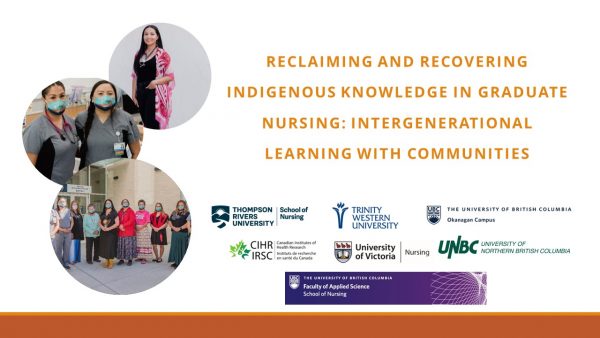A team of researchers at six BC universities are the proud recipients of the Canadian Institutes of Health Research (CIHR) grant, sharing $683,000 in funding for their Reclaiming and Recovering Indigenous Knowledge in Graduate Nursing Education project.
Led by Thompson Rivers University (TRU) Associate Professor Dr. Lisa Bourque Bearskin and UBC Okanagan (UBCO) Associate Professor Dr. Donna Kurtz, the team will conduct intergenerational learning with communities to reclaim and recover Indigenous knowledge in graduate nursing education.
Indigenous-focused experience
Project research aims to identify learning processes and outcomes of an Indigenous-focused education, training and mentorship experience. Funding allows the team to integrate local Indigenous knowledge of wellness with a cohort of graduate nursing students at six BC universities – UBCO, UBC (Vancouver), TRU, University of Victoria, University of Northern BC and Trinity Western University – by promoting culturally safe, gender-relevant pathways to advance education and practice of Indigenous health nursing.

© Billie Jean Gabriel Photography
“The provision of culturally safe and appropriate care is a priority for the First Nations Health Authority (FNHA),” says Chief Nursing Officer Dr. Becky Palmer. “It is critical that FNHA be engaged in enhancing cultural humility through incorporating Indigenous knowledge in nursing as well as building capacity for Indigenous clinicians and health-care practitioners.”
The research team will work with graduate students to explore education, research and mentorship in Indigenous health that best supports their development as nursing leaders. They will then develop, monitor and evaluate curriculum, experiential learning and Indigenous community placement opportunities offered in the program. The cohort of students, community mentors and faculty will create the program and provide intergenerational mentorship to nurses in their communities and to students in their institutions School of Nursing.
UBCO School of Nursing Acting Director Jackie Denison believes students will benefit from this much-needed research.
“This important project will provide an opportunity for a truly Indigenous focused education program, which will enhance the navigation of graduate studies for Indigenous nurses. Students will experience a strength-based indigenized curriculum, learning from communities across the Province of British Columbia. This educational program is pivotal in transforming nursing practice and nursing knowledge.”
For TRU School of Nursing Dean Dr. Rani H. Srivastava, funding for this project comes at a critical time.
“The grant will provide valuable support in working with Indigenous community leaders and graduate students to support the development of Indigenous nurse leaders who are urgently needed in the profession and the health-care system.”
Addressing Indigenous-specific racism
Trinity Western University Dean of Nursing Dr. Sheryl Reimer-Kirkham and School of Nursing Master of Science Director Dr. Barbara Astle describe this study as a collective response to answering the call.
“Reconciliation in Canada must occur in and through all of our institutions, including higher education and health services, which this initiative brings together. At a time of a global nursing shortage that cannot be addressed without preparing nurses at advanced master’s level, it is critical that all graduate nursing programs incorporate Indigenous knowledge and support Indigenous nurses. The graduate nursing initiative also builds capacity for the new BC Practice Standard on Indigenous Cultural Safety, Cultural Humility and Anti-racism.”
UBC School of Nursing Associate Professor Dr. Leanne Currie echoes the significance of this work.
“This is a program that, from the beginning, values and centres Indigenous ways of knowing and Indigenous knowledge. This collaborative project will expand the network of support for Indigenous students, faculty and staff, taking the weight of leading transformation off of the shoulders of individuals by harnessing the power of collective action.”
Engaging for change
“Our partners are very excited to establish this collaborative and innovative approach and to focus on enhancing training and developing curriculum to address anti-Indigenous racism,” says Bourque Bearskin, who recognizes the opportunities the award presents.
“Funding will enable us to advance an improved understanding of the barriers and facilitators to implementing and integrating Indigenous knowledge systems in graduate nursing education. In addition, the formation of a multi-site community-university partnership with clearly articulated guidelines, priorities and decision-making processes creates a pathway to inform systems changes in Indigenous health.
“Further, results from this study will inform education and policy reform to increase the recruitment and retention of Indigenous nurses. This research will contribute to the program’s ongoing development and knowledge translation from Indigenous nursing education to other institutions.”
Moving forward
University of Victoria PhD graduate student Leanne Kelly acknowledges the benefits an Indigenous-focused graduate program will provide.
“Nurses who are currently working with First Nations communities are developing substantial insight about Indigenous knowledge, equity issues and strength-based approaches to addressing health challenges. The creation of a graduate program that foregrounds the opportunity to articulate this learning would open up a whole lane of nursing discourse that needs greater visibility. Imagine the voices that could heard!”
Dr. Shelly Johnson, Canada Research Chair in Indigenizing Higher Education at TRU, recognizes the importance of the grant.
“For far too long, mainstream Western graduate nursing education acted to deliberately ignore Indigenous knowledge contributions. This biased stance weakened potential Indigenous contributions to collectively strengthen nursing education competencies and work towards patient well-being. This grant has the potential to meaningfully address this shortfall in ways to strengthen health outcomes for Indigenous and non-Indigenous peoples.”
UNBC School of Nursing Interim Chair Dr. Caroline Sanders explains the importance of collaborative work.
“In sharing this work, working in collaboration is vital in rural contexts in supporting an equity and inclusive approach to Indigenous scholarship. Here we will work with community leaders to advance Indigenous nursing education that is distinct to the location where we teach and learn.”

